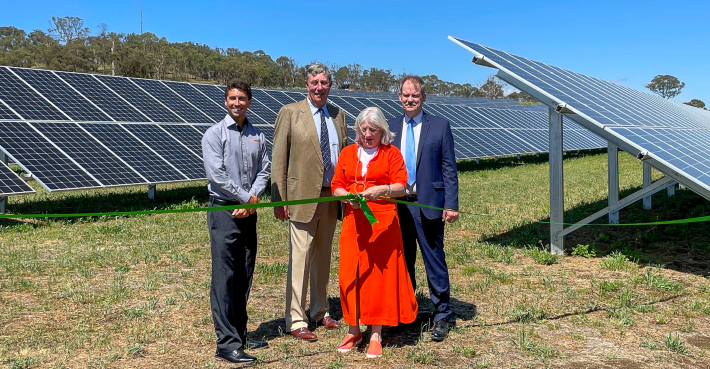UNE Vice-Chancellor and CEO Professor Brigid Heywood cut the ribbon under sunny skies, heralding the beginning of UNE's green transformation.
"UNE’s solar farm is part of our wider commitment to the use of renewables. It’s deeply important to us as a community that that the contribution we make is not only through the purpose of education, but be a contributor to the success of this planet going forward,” Professor Heywood said.
“Our new solar farm is expected to reduce carbon emissions by up to 5000 tonnes per year, which is the equivalent of taking 1000 cars off the road or power more than 800 households.
“Clean energy generated by our own facility will also be cheaper energy and allow UNE to direct the considerable savings realised towards teaching and research. We anticipate the farm will deliver $7 - 8 million in savings to the university within 10 years."
Delivered by established commercial solar systems provider Solgen Energy, the $6.3 million 3.2-megawatt solar farm's 8,700 fixed, ground-mounted photovoltaic solar modules are installed on UNE land adjacent to the campus' northern boundary, near Clarkes Road.
The solar farm project commenced in 2016 but experienced delays due to complexities with the higher voltage network associated with the UNE campus.
Professor Heywood said it was well worth the wait. "Not only will the solar farm substantially reduce our carbon footprint; it has the added benefit of serving as an important learning tool," she said. "It will provide hands-on opportunities for research and teaching in renewable energy, and is closely aligned with community expectations to move to more sustainable power sources."
There are plans in place for a Phase 2 of the project to supply 100 per cent of the academic campus with renewable energy, with battery storage for night time consumption.
The solar farm is just one in a series of UNE’s sustainability projects.
A modern geothermal heating system was completed in 2020 to heat the SportUNE indoor pool. The new system is expected to reduce SportUNE’s annual CO2 emissions by approximately 197,000kg, which is equivalent to the CO2 absorbed by 8,000 trees.
Since water restrictions were introduced in March 2019, the University has actively worked with its staff, residential students and Armidale Regional Council to improve its water efficiency. The UNE community's collective efforts have resulted in a 75% reduction in water consumption on the academic campus.
UNE has a project underway that will see the capacity of the on-campus Lake Zot increased to help make the campus more self-sufficient in water usage.


